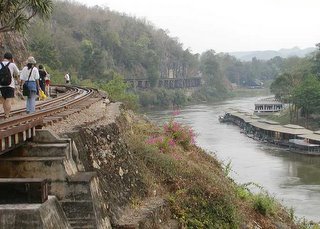Death Railway Bridge - Kanjanaburi - Thailand
~
Friday, June 30, 2006
The so-called 'Bridge on the River Kwai' looks quite ordinary, but its dramatic story may be of interest. The bridge spans the Mae Nam Khwae Yai, a tributary of the Mae Nam Mae Klong, 3km from Kanjanaburi's lak meuang (town pillar/phallus). Khwae Yai literally translates as 'large tributary'. The materials for the bridge were brought from Java by the Imperial Japanese Army during their occupation of Thailand. In 1945 the bridge was bombed several times and was only rebuilt after the war - the curved portions of the bridge are original. The first version of the bridge, completed in February 1943, was all wood. In April of the same year a second bridge of steel was constructed.
The materials for the bridge were brought from Java by the Imperial Japanese Army during their occupation of Thailand. In 1945 the bridge was bombed several times and was only rebuilt after the war - the curved portions of the bridge are original. The first version of the bridge, completed in February 1943, was all wood. In April of the same year a second bridge of steel was constructed.It's estimated 16,000 prisoners of war (POWs) died building the Death Railway to Myanmar, of which the bridge was only a small part. The objective of the railway was to secure an alternative supply route for the Japanese conquest of Burma and other Asian countries to the west. Construction of the railway began on 16 September 1942 at existing terminals in Thanbyuzayat, Myanmar and Nong Pladuk, Thailand. Japanese engineers at the time estimated that it would take five years to link Thailand and Myanmar by rail, but the Japanese army forced the POWs to complete the 415km, 1m-gauge railway (of which roughly two-thirds ran through Thailand) in 16 months. Much of the railway was built in difficult terrain that required high bridges and deep mountain cuttings. The rails were finally joined 37km south of Three Pagodas Pass; a Japanese brothel train inaugurated the line. The River Khwae Bridge was in use for 20 months before the Allies bombed it in 1945. Only one POW is known to have escaped, a Briton who took refuge among pro-British Karen guerrillas.
 Train enthusiasts may enjoy the railway museum in front of the bridge, with engines used during WWII on display. Every year during the first week of December there is a nightly sound-and-light show at the bridge, commemorating the Allied attack on the Death Railway in 1945. It's a big scene, with the sounds of bombers and explosions, fantastic bursts of light and more. The town gets a lot of Thai tourists during this week, so book early if you want to witness this spectacle.
Train enthusiasts may enjoy the railway museum in front of the bridge, with engines used during WWII on display. Every year during the first week of December there is a nightly sound-and-light show at the bridge, commemorating the Allied attack on the Death Railway in 1945. It's a big scene, with the sounds of bombers and explosions, fantastic bursts of light and more. The town gets a lot of Thai tourists during this week, so book early if you want to witness this spectacle.
0 comments:
Post a Comment